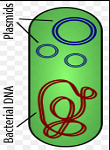|
|
|
EDITORIAL: Developing Antibiotics with “Selfish DNA” Plasmids
|
|
|
|
|
|
|
|
|
|

|
|
|
|
Aparna Rao, PhD, and Somdutta Saha, PhD
|
|
|
|
University of Pittsburgh, and GlaxoSmithKline
|
|
Dept. of Neurosurgery, University of Pittsburgh, Pittsburgh PA 15232, USA,
Computational Biology, GSK R&D, 1250 South Collegeville Road, Pennsylvania 19426, USA
|
|
apr15@pitt.edu
|
|
|
|
|
|
|
|
|
|

|
|
Plasmids are small circular double-stranded DNA molecules that are most commonly found in bacteria. They replicate independently of chromosomal DNA. Plasmids often encode genes that provide a survival advantage to the organisms(1). For instance, plasmids may carry genes that confer resistance to naturally occurring antibiotics, or may provide the organism the ability to selectively utilize particular nutrients that will aid in survival when food is scarce. However, the maintenance and replication of plasmids impose immense metabolic burden on the bacterial host, mainly in terms of reduced host growth and viability.
|
|
|
|
|
|
|
|

|
|